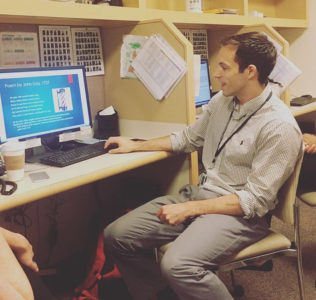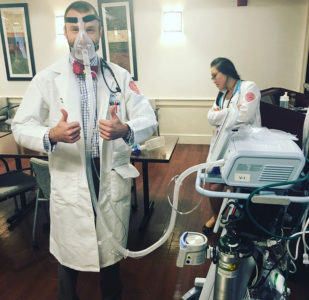Internship
The internship includes many rotations such as the inpatient general medical wards, sub specialty wards, medical and cardiac intensive care units, emergency department, and ambulatory rotations. Additionally, 4 weeks of vacation are allotted in 1 two-week block and 2 one-week blocks.
For categorical and primary care interns, inpatient rotations span 3 weeks followed by 1 week of ambulatory experience comprising both continuity and subspecialty clinics (See 3+ 1 scheme). Preliminary intern rotations will also span 3 weeks with intermittent elective time in between.
| General Estimates: | ||||||||||||||||||||||||||||||
|
||||||||||||||||||||||||||||||
| * Preliminary interns | ||||||||||||||||||||||||||||||
| ♦ Primary Care Track interns have additional ambulatory blocks |
The majority of the core inpatient general internal medicine training occurs at Boston Medical Center (BMC), complemented by a shorter experience at the Boston Veterans Administration Hospital (VA). At all hospitals, the intern is responsible for initial patient evaluation and selection of appropriate management strategies. Interns are gradually encouraged to make independent management decisions on patients and are given guidance and support by the residents, closely supervised by attendings. At BMC, the experience emphasizes acute medical illnesses prevalent in an inner-city patient population as well as a variety of patients at all levels of complexity referred to a major tertiary medical center. On the inpatient service at the VA, interns are responsible for patients with a broad spectrum of pathologies including significant cardiovascular, pulmonary and oncologic disease. The inpatient ward teams are structured such that the intern works with another intern, third and/or fourth year BU medical students, a resident and an attending physician who is both the attending of record and the teaching attending. At the VA all BMC house staff work alongside house staff from the Brigham and Women’s Hospital and the Beth Israel Deaconess Medical Center.
 Interns will also have inpatient specialty ward experiences at BMC on the Cardiology, Hematology/Oncology, Renal, and Geriatric services. All interns will not spend time on all 4 services, but most will do at least one month on one of the four services. The Hematology/Oncology service at BMC provides training in the evaluation and management of a challenging referral population with a wide range of malignancies and hematologic disorders such as lung cancer, breast cancer, leukemia, and amyloidosis. The Renal service provides interns with exposure to patients with end-stage renal disease requiring hemodialysis or peritoneal dialysis. Renal transplant patients are also cared for by the Renal service. The inpatient Geriatric service is the central site for the acute care of elderly patients cared for by Geriatricians at BMC, allowing for excellent continuity of care. Interns will be exposed to a vast network of nursing facilities and home care services provided for their patients while out of the hospital. Additionally, an inpatient Cardiology rotation is available at the VA, which is the major referral center for patients with acute and chronic cardiac disease from all over New England. None of the subspecialty services require overnight call. All house officers have the opportunity to indicate a preference for these rotations as interns and residents.
Interns will also have inpatient specialty ward experiences at BMC on the Cardiology, Hematology/Oncology, Renal, and Geriatric services. All interns will not spend time on all 4 services, but most will do at least one month on one of the four services. The Hematology/Oncology service at BMC provides training in the evaluation and management of a challenging referral population with a wide range of malignancies and hematologic disorders such as lung cancer, breast cancer, leukemia, and amyloidosis. The Renal service provides interns with exposure to patients with end-stage renal disease requiring hemodialysis or peritoneal dialysis. Renal transplant patients are also cared for by the Renal service. The inpatient Geriatric service is the central site for the acute care of elderly patients cared for by Geriatricians at BMC, allowing for excellent continuity of care. Interns will be exposed to a vast network of nursing facilities and home care services provided for their patients while out of the hospital. Additionally, an inpatient Cardiology rotation is available at the VA, which is the major referral center for patients with acute and chronic cardiac disease from all over New England. None of the subspecialty services require overnight call. All house officers have the opportunity to indicate a preference for these rotations as interns and residents.
Interns obtain training in intensive care in the Medical Intensive Care Unit (MICU) at BMC and the VA, where they manage a variety of critically ill patients under the supervision of Pulmonary/Critical Care fellows and attending staff. They learn about the management of many critical illnesses including septic shock, respiratory failure, stroke, and GI bleeding. The Cardiac Care Unit (CCU) experience is also obtained at BMC and the VA, where they learn to manage acute cardiac diseases such as acute coronary syndromes, decompensated heart failure, and arrhythmias. The MICU service at BMC consists of two teams each with two interns, two residents, a fellow, and attending. There are dedicated teaching conferences during these months.
Training in Emergency Medicine is at the BMC Emergency Department, where interns evaluate and treat patients with medical emergencies under the supervision of Emergency Medicine faculty. Interns evaluate patients in acute and non-acute settings in the ED in order to gain experience in appropriate emergent management. In the BMC Emergency Department, which is the busiest in the state of Massachusetts and one of only two level-1 trauma centers in eastern Massachusetts, Internal Medicine house officers work side-by-side with colleagues from Surgery, Pediatrics, Obstetrics/Gynecology, Psychiatry and Emergency Medicine. Interns will spend part of their time in the ED on overnight shifts.
Overall, the various intern rotations offer a rigorous, yet extensive and highly valued educational experience in internal medicine. By the end of the intern year, house officers would have been exposed to a vast array of patients from multiple ethnic and socioeconomic backgrounds and gain confidence in managing patients with a wide spectrum of acute and chronic illnesses that is unparalleled in residency training.

